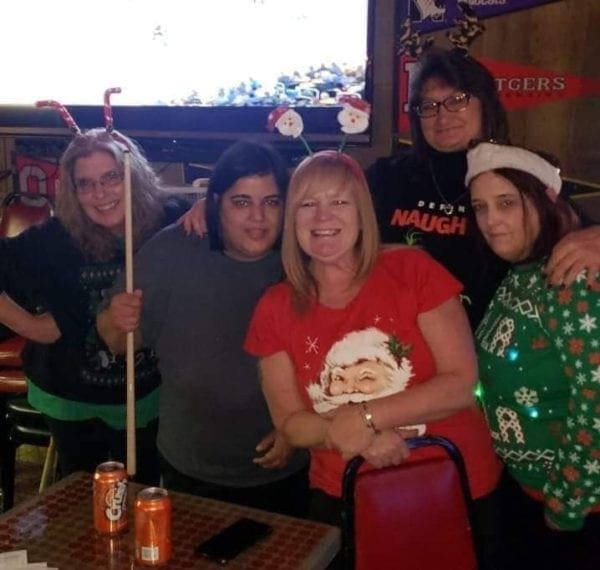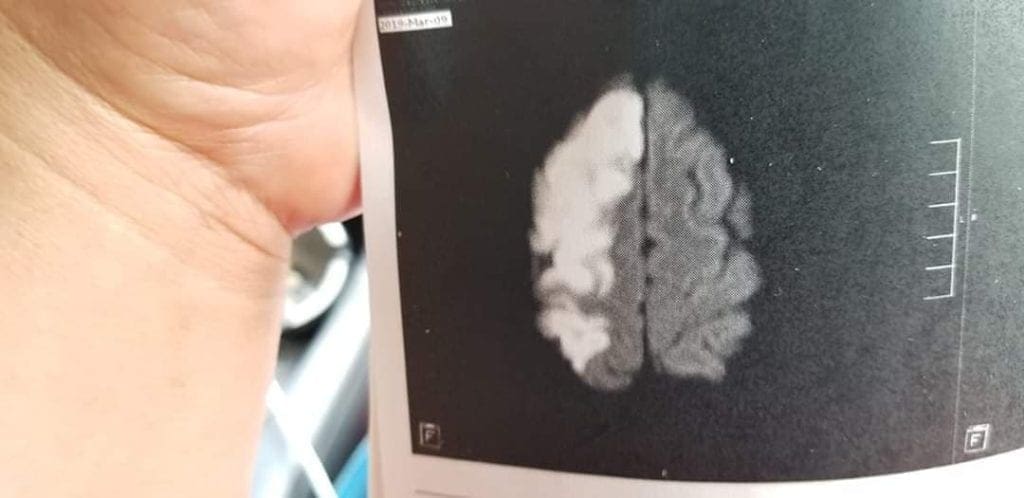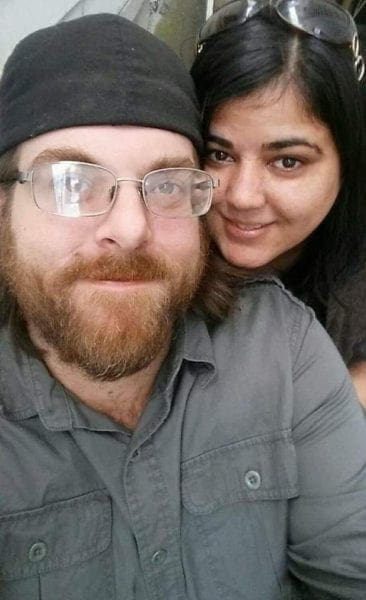If you’re inclined to believe in the concept of karma, then Kat Lucas’ karma train is long overdue at the station.
And when it pulls in, it best be hauling a Powerball jackpot-sized chest of cold hard cash. There should be enough she can swim in it.
It would only be fair. For the last five years, Lucas has been the winner of the “statistical anomaly sweepstakes” for medical issues, and certainly not in a good way.
In a study cited by the American Heart Association, from 2009-2012, females aged 20-39 who suffered a stroke made up only 0.7 percent of the population. Lucas had two, on the same day, when she was 35. One minor, and one major. Then, less than a year later, just as she was nearing full recovery, two more happened. So, for those who are counting, that’s four before the age of 37.
What eventually was determined as the cause of Lucas’ problems as a carotid web, a type of fibromuscular dysplasia (FMD). FMD occurs in only 0.3-3 percent of strokes in the cervico-encephalic arteries. So, a rarity, wrapped inside a rarity. How does one get so “lucky?”
Fortunately for the former Kat Stewart, a multi-sport athlete at Bridgeport High School, she has the loving support of her husband and family, and a wicked sense of humor, both about her struggles and life in general.
A former employee of Peterson Rehabilitation Hospital, Lucas has four degrees in various medical disciplines, ranging from associate to bachelor. She looks forward to the day she can return to the working world but is thankful for each day she can arise and push forward. For a time, she wasn’t sure if that was going to be a possibility.
Fiercely independent, Lucas was faced with the possibility of having to rely on others for her care for the rest of her life. So, you can forgive her a little cathartic humor now and again when it comes to her situation and the world around her.

How old where you when you had your first stroke and where were you when it happened?
I was 35 years old when I had my first two. The first one happened in Dr. Blatt’s office. They rushed me over to the ER at OVMC and 20 minutes later, I had a massive stroke. Within a half hour, they were flying me by helicopter to Pittsburgh and Allegheny General Hospital.
Given your young age when it happened, what were your thoughts initially after the stroke and during rehab? How long did it take to relearn everything the first time and how difficult was that both mentally and physically?
I didn’t know what was going to happen. I had no movement on my left side. It was completely paralyzed. Ninety-five percent of the right side of my brain was affected. My speech was impaired. The neurologist that came into my room after reading my MRI said I’m lucky to be alive. I should have been dead. That being said, I knew I couldn’t give up. I did not want to be put in a nursing home. I got admitted into ICU and I laid there for three days just concentrating on trying to get movement in my leg and arm. It took about 72 hours before I was able to walk again and it took about two months before I was able to lift my arm without any trouble. I had extensive outpatient therapy at Peterson Rehab Hospital. And then at home I would spend about 16 hours a day doing therapy exercises. Every day I told myself I was a day closer to getting back to normal.

Explain a bit about the condition and did they diagnose that after the first stroke. Was it tough on you mentally while getting back to some sense of normal?
I was diagnosed with a carotid web, but nothing was done about it and they left my strokes as reason unknown. It was beyond stressful both mentally and physically. In the worst way possible, you go from being independent to being dependent on someone else to do a lot for you, every day, all day long, and the frustration that comes in when you’re mentally stressed because you’re worried about if you’re being a burden to others because they have to pretty much help you with everything. What’s exceptionally hard is the fact that I used to be so intelligent. I’m still smart, but I can no longer explain things the way I used to. I don’t always comprehend things and a lot of people think I’m normal but I’m really not. I try to say, “Hey I’m not the person I used to be.” I’m not making excuses. It’s just is what it is.
How close getting back to full functionality were you when the next ones happened? How many total and how do you adjust your life knowing another is possible? Do anything different or choose to push on as usual despite the possibilities?
About eight months later and through a lot of blood, sweat and tears, I was almost back to normal by age 36. The morning of November 24, I woke up around 3:30 a.m. because I didn’t eat the night before. So, I had a Mountain Dew, a Reese’s Cup, and laid back down and went to sleep. Around 7:30 a.m., I got back up with my husband as he was leaving to go help a friend. I noticed a change in my speech, but really couldn’t figure it out and I just brushed it off. I laid back down but couldn’t stop thinking about why my speech sounded different.
Then it hit me. I hurried up and picked up my phone and tried to smile in front of the camera, only to realize my left side of my face was not moving. I instantly started crying. They told me this was not going to happen again. I had a better chance of winning the lottery than having another stroke. I called my husband and told him what happened and then called an ambulance, which took me to Wheeling Medical Park. The ER doctor called my neurologists at Allegheny General Hospital and said to get me up there as soon as possible. I arrived at Allegheny General Hospital within about an hour and a half and my doctors met me in the ER room and he told me the carotid web in my right carotid artery was what caused all the strokes … the next day they were planning on doing the surgery. All of a sudden, my arm fell off the table and I didn’t feel right. I had another stroke. I was rushed downstairs to a cat scan and by the time I got back to the room, they decided to take me back downstairs for a thrombectomy.
I was awake through the whole procedure and it was very painful. They removed two large clots and I was taken to ICU. I’ve had to adjust my life because this last stroke affected me worse than the first three together. My brain lags worse than it ever did, and I have a lot of trouble remembering things. I’m not bouncing back the way I did when the first massive one hit. I’m at my four-month mark right now and I’m so far from where I want to be. I was able to have the surgery on December 30th, 2019. This carotid web was removed. It’s known as atypical fibromuscular dysplasia which is a rare disease. It was pretty much like a ligament was growing in my carotid artery but since removal I have had no symptoms that I’ve had over the last several years of which consists of hemiplegic migraine strokes which started to plague me back in 2014. So, right now, I’m just living life to the fullest and hoping I continue to stay symptom-free and stroke free. I have to be constantly monitored to make sure that the carotid web does not grow back.

You were married in 2017. Does having a spouse and a closer support system make it any easier for you? What advice would you give people battling through similar or equally difficult situations?
I got married in 2017 to my husband Tim, who has been my rock through all of this. Having a great support system makes it a lot easier and bearable. The therapists from Peterson Rehabilitation Hospital, Case, Cierra, Emily, Ted, Kristen, and I see Nicole and Brooke at Wheeling. They have played a huge role in my recovery. My whole mentality through this whole ordeal has been that people go through way worse every day and my situation could be way worse still. I could be stuck in a bed somewhere. So, my advice for anyone going through a similar situation is to never give up fighting, as frustrating as it may be sometimes. Try not to let the depression kick in and try to keep a positive attitude.

